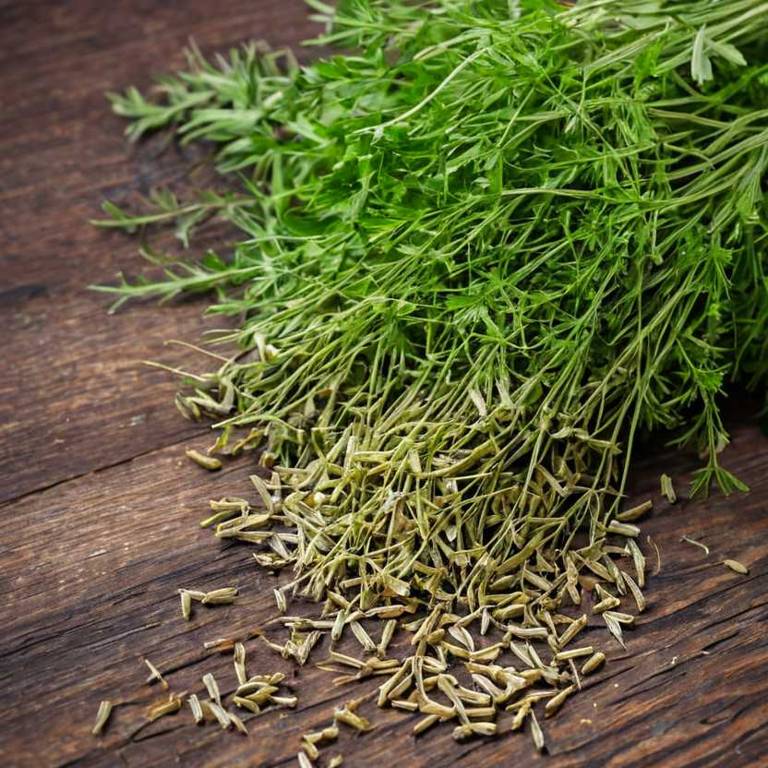By Leen Randell
Updated: Jul 20, 2024
10 Medicinal Constituents Of Foeniculum Vulgare (Fennel)

Foeniculum vulgare has active constituents such as anethole, fenchone, and limonene.
These compounds exhibit anti-inflammatory, antibacterial, and antispasmodic properties, making fennel a popular remedy for digestive issues, nausea, and menstrual cramps. Anethole, in particular, has been shown to ease anxiety and improve cognitive function, while limonene may help reduce inflammation and improve immune function.
As a result, fennel can alleviate symptoms of irritable bowel syndrome, menopausal symptoms, and even certain neurological disorders.
This article explains in details the 10 best active constituents of Foeniculum vulgare.
1. Fenchol
Foeniculum vulgare fenchol is a naturally occurring terpene alcohol found in the essential oil of its leaves and seeds.
It has been used for centuries in traditional medicine and culinary practices due to its various health benefits and unique flavor profile.
Fenchol has been shown to have anti-inflammatory properties, antiseptic qualities, and even antibacterial effects, making it a popular ingredient in natural remedies and herbal products.
2. Anethole
Foeniculum vulgare anethole is a naturally occurring compound extracted from the seeds and essential oil of this plant.
Anethole has been used for centuries in traditional medicine and food flavoring due to its unique properties. It has antimicrobial, antifungal, and anti-inflammatory effects, making it a popular ingredient in herbal supplements and culinary applications.
Additionally, anethole is known for its sweet licorice-like flavor and aroma, which is often used as a spice or additive in various foods and beverages.
3. Estragole
Foeniculum vulgare estragole is a natural compound found in the essential oils of sweet and bitter fennel plants.
It is a phenolic amine, which has been studied for its various biological activities, including antioxidant, anti-inflammatory, and antimicrobial properties.
Estragole has been used traditionally to treat digestive issues, respiratory problems, and as an oral disinfectant, and has also been shown to exhibit potential anticancer and antiviral effects.
4. Linalool
Foeniculum vulgare linalool is a natural compound extracted from its seeds.
Linalool is a sesquiterpene alcohol that has been used for centuries in traditional medicine and aromatherapy due to its calming, relaxing, and antispasmodic properties.
It is commonly used to alleviate stress, anxiety, and insomnia, as well as to treat digestive issues and skin conditions.
5. Beta-phellandrene
Foeniculum vulgare beta-phellandrene is a natural compound extracted from the essential oil of the plant's seeds.
It is a sesquiterpene hydrocarbon that has been found to possess various bioactive properties, including antioxidant, anti-inflammatory, and antimicrobial activities.
Beta-phellandrene has also been reported to exhibit potential therapeutic effects on the respiratory system, making it a promising natural treatment option for various health issues.
6. Gamma-terpinene
Foeniculum vulgare gamma-terpinene is a bioactive compound isolated from the essential oil of its leaves and seeds.
It has been reported to possess various biological activities, including antimicrobial, antioxidant, and anti-inflammatory properties. Gamma-terpinene has also shown potential in inhibiting the growth of certain microorganisms and reducing oxidative stress.
Its therapeutic uses include treating respiratory disorders, such as bronchitis and asthma, as well as alleviating gastrointestinal issues like irritable bowel syndrome.
7. Limonene
Foeniculum vulgare limonene is a naturally occurring monoterpene compound found in its essential oil.
This citrusy-smelling hydrocarbon is responsible for the characteristic aroma and flavor of fennel seeds and leaves.
Limonene has been traditionally used in folk medicine to treat various ailments, including digestive issues, and has also been shown to possess antioxidant and anti-inflammatory properties.
8. Terpinen-4-ol
Foeniculum vulgare terpinen-4-ol is a bioactive compound isolated from the essential oil of its seeds.
It is a phenolic monoterpene that has been reported to exhibit various pharmacological properties, including anti-inflammatory, antimicrobial, and antioxidant activities. Terpinen-4-ol has also been shown to possess antispasmodic effects, making it a potential treatment for respiratory disorders such as bronchitis.
Additionally, its antifungal properties may contribute to the plant's traditional use in herbal medicine.
9. Alpha-pinene
Foeniculum vulgare alpha-pinene is a sesquiterpene oil compound that is naturally occurring in the plant's leaves and stems.
It is responsible for the aromatic properties of fennel, giving it its distinctive anise or licorice-like scent.
Alpha-pinene has been traditionally used in herbal medicine to treat various ailments, including digestive issues and respiratory problems, due to its anti-inflammatory and antispasmodic properties.
10. Camphor
Foeniculum vulgare camphor is a natural essential oil extracted from the seeds of the plant.
It has been used for centuries in traditional medicine and aromatherapy due to its therapeutic properties. The oil has a calming effect on the body, relieves digestive issues, and is also effective in treating respiratory problems such as bronchitis and asthma.
Camphor oil is often blended with other oils to enhance its benefits.